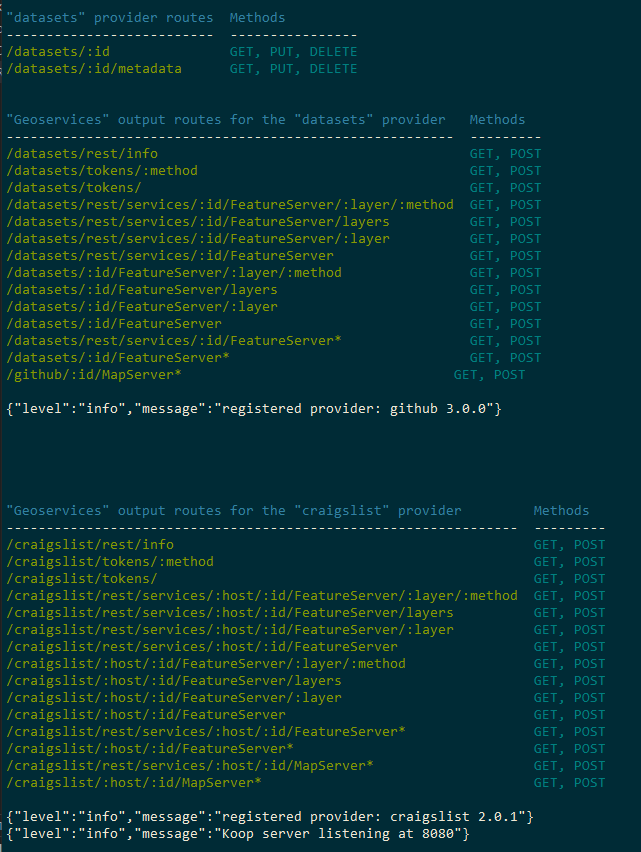See instructions below to install for Kubernetes or Docker ~ Koop is a JavaScript toolkit for connecting spatial APIs. Out of the box, it exposes a Node. js server that translates GeoJSON into the GeoServices specification supported by ArcGIS products.
Boilerplate REST API to get you started faster, with json config for Redis cache, Postgres/PostGIS support for speed, & local file store config if not using s3.
- koopjs/cli
- arcgis/core@4.25.0-next.20221012
- pg: Postgres/PostGIS support
- koop-queue
- koop-s3fs: AWS s3 connect
- koopjs/output-vector-tiles
- koopjs/provider-agol
- koopjs/provider-s3-select
- koopjs/provider-file-geojson
- koopjs/provider-github
- GDAL: Read and write raster and vector geospatial datasets straight from Node.js with this native GDAL binding. GDAL 2.4.4 (GEOS 3.4.2, PROJ 4.8.0) comes bundled, so node-gdal will work straight out of the box. To get started, browse the API Documentation or examples.
- Worker Farm: A worker bot to run jobs for Koop
- Koop Exporter: A Koop cache must be registered to work.
- FeatureServer An open source implementation of the GeoServices specification.
- And more!
The json config is located in: /koop/config/default.json, and is pre-configured to support custom ports, redis cache, local filestore and Postgres/PostGIS for faster retrieval of geospatial information with Koop FileExporter for interop.
{
"port": 8080,
"cache": {
"redis": {
"host": "redis://localhost:6379"
}
},
"filesystem": {
"local": {
"rootDir": "/var/koop/files"
}
},
"db": {
"postgis": "postgres://postgres:postgres@localhost:5432/geo_database"
}
}
-
http://localhost:8080/github/koopjs::geodata::north-america/FeatureServer/0/query
-
http://localhost:8080/craigslist/seattle/apartments/FeatureServer/0/query
Once the container is built, you'll see the boilerplate REST API connecting to GitHub and CraigsList data:
The Dockerfile is a multi-stage docker build to reduce image size. To skip build times pull the image and run:
Pull: docker pull jhoeller/koopjs
Run: docker run --rm -it -d -v "${PWD}:/usr/src/" -p 8080:8080 -p 9000:9000 -p 80:80 jhoeller/koopjs:latest
-
git clone https://github.com/salinaaaaaa/koopjs.git -
docker build -t koopjs . -
docker run --rm -it -d -v "${PWD}:/usr/src/" -p 8080:8080 -p 9000:9000 -p 80:80 koopjs
-
cd helm -
helm install koopjs .
helm install koopjs . --set service.type=ClusterIP --set service.port=80
export NODE_PORT=$(kubectl get --namespace default -o jsonpath="{.spec.ports[0].nodePort}" services koopjs)
export NODE_IP=$(kubectl get nodes --namespace default -o jsonpath="{.items[0].status.addresses[0].address}")
echo http://$NODE_IP:$NODE_PORT
